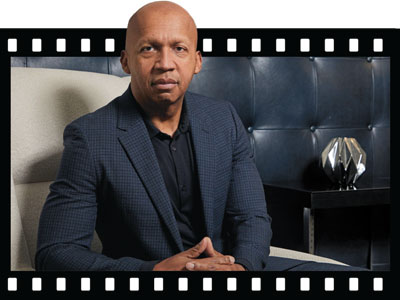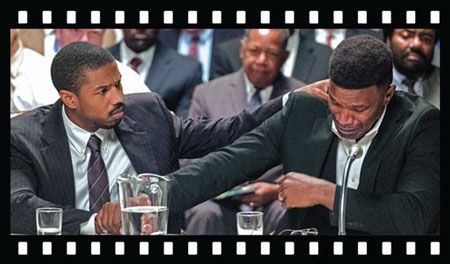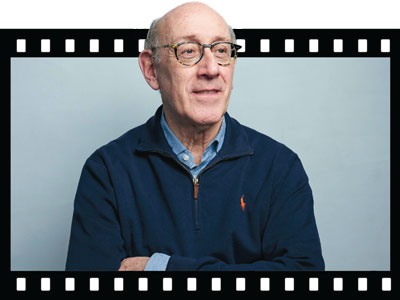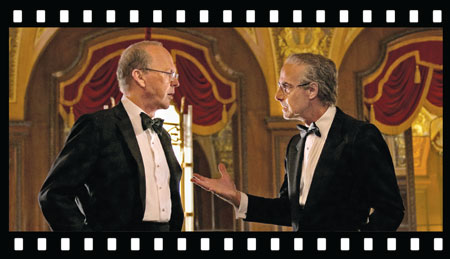Double Feature
Bryan Stevenson and Kenneth Feinberg ’70 get the Hollywood treatment with biopics ‘Just Mercy’ and ‘Worth.’
BY ALANA GRAMBUSH AND JADE MCCLAIN
A young criminal defender fights to free his client from death row. A mediator weighs the heart-wrenching claims of hundreds of families who lost loved ones in a terrorist attack. This past year, these compelling legal dramas became critically acclaimed feature films, Just Mercy and Worth, with Hollywood heavyweights Michael B. Jordan and Michael Keaton in leading roles—portraying two members of the NYU Law community.
Aronson Family Professor of Criminal Justice Bryan Stevenson is the founder of the Equal Justice Initiative (EJI), a nonprofit focused on ending excessive and unfair sentencing. Kenneth Feinberg ’70, who oversaw the distribution of funds to victims of the BP oil spill, the Volkswagen emissions scandal, and many other matters, is arguably the nation’s leading administrator of settlement and compensation funds. Their memoirs provided the basis for the two biopics. Just Mercy had its theatrical release in December 2019, while Worth premiered at the Sundance Film Festival in January 2020.
Jordan portrays Stevenson as he represented client Walter McMillian, an African American man who was wrongly convicted and sentenced to death for the murder of a young white woman. In Worth, Keaton plays Feinberg during the time he spent as special master of the September 11th Victim Compensation Fund, set up for the families of those who died or were injured as a result of the 9/11 attacks in New York City. Feinberg and his team were tasked with evaluating claims— Feinberg himself presided over more than 900 of the 1,600 claim hearings—and determining the monetary award in each case.
While each lawyer’s mission was very different, the experiences of both men—and the films based on their work—underscore themes of human dignity and value. NYU Law Magazine spoke with Stevenson and Feinberg about what it was like to see their stories on the big screen.
Bryan Stevenson
★★★★★
What led to your memoir becoming a film? The book was published at the end of 2014, and a few months after that, my agent started hearing from people who said, “Oh, we might be interested in doing a film.” It was a bit of a surprise to me that there was that interest, but I see the book and much of our work right now as narrative work.
So I was open to a movie, but I was pretty apprehensive. I’ve just seen too many books get turned into movies that don’t reflect what was important and essential about the book. But eventually I was introduced to [Destin Daniel Cretton], who ended up being the director. He had done a film called Short Term 12, and I was really impressed by it—it had nuance and heart— and I said yes.
What makes Walter McMillian’s case a good story for the movies? Initially, when I was writing the book, it was just going to be one chapter, but because there was so much in that particular case and there were so many ups and downs, I thought it would be a good spine for the entire book. So the book is structured around the case.
I think the irony of [Walter] being convicted and condemned in a community that is also the place that inspired Harper Lee’s To Kill a Mockingbird—[a community that] so romanticizes their relationship to that narrative—was a rich place to start. And there were a lot of characters in that case, and it had a lot of dramatic potential. It was, as they told me, cinematic.
Could you talk more about your experience working with the filmmakers and actors, and what that process was like? Destin was very solicitous, and we went through several versions of the script. At one point it didn’t feel like it was moving in the right direction, and he came out with a writing partner and Niija [Kuykendall], who is one of the producers. We spent a whole day just working on that, and Destin said over and over again, ‘I don’t want to do this if it’s not right,’ and that just gave me a lot of confidence that we could get to the right place.
[Michael B. Jordan] had a similar approach. He came to Montgomery, we spent a good bit of time together, and we talked through things. Everybody wanted it to be respectful and authentic, and the other actors really got into the source material about the characters. So I was really thrilled with the way they approached things and I got to spend a lot of time with them since the film was shot. I was on set a couple of times, but even since then, doing the promotions, and they’re really wonderful people, and I’ve enjoyed working with them enormously.
Were you a little star-struck? I was, because I don’t watch a lot of TV, but it just happens that the handful of things I had seen, [Michael] had been a part of. So I saw The Wire, I had actually watched Friday Night Lights, and when Fruitvale Station came out, I loved the movie, and I loved Michael’s performance.
And it was funny—when we met, it was before he sort of blew up. It was before Creed and before Black Panther, and I just admire the fact that he was so sincere and that he was so committed to the issues, in addition to being committed to the film.
What are some of the biggest differences between the film and the real-life events? In the book I write about two young lawyers who worked with me on the case, a guy named Michael O’Connor and another lawyer by the name of Bernard Harcourt. And [the film] sort of uses the Eva character as a composite of those two folks.
The other [difference] is just the pacing. The litigation went on for six years, and in the movie, it ends up being a lot more linear than it was in real life. Apart from that, virtually every scene is a scene that happened. I did go to death row for the first time and a prisoner sang to me. I was pulled over by the police and had a gun pointed at my head. I was strip-searched—it was not in connection with this case, but with another case. We did get bomb threats and death threats. They put Mr. McMillian on death row pretrial, Mr. Myers on death row pretrial.
I did not go to the prosecutor’s house. We did meet and we had a conversation, not unlike the conversation you see in the film, but it wasn’t at his house. I wasn’t quite that bold.
How would you describe the current racial climate in Alabama compared to when you first began your work? I don’t think it’s changed remarkably. I think we’ve been here long enough that people have gotten used to our work and our advocacy. But when you get a community riled up over a particularly upsetting crime and you persuade them that they’ve got the right person, and someone comes in and starts to challenge that, there will be pushback. I don’t think that has changed.
I do think our work here in the state has created a consciousness about the rights of people who are wrongly convicted and the rights of people who are condemned, so that there is an awareness that they’re entitled to counsel. We still don’t have a public defender system. We still have a very underfunded system, and in many ways, the courts are even less diverse now.
What were your thoughts when you first watched the film, and what was it like to see yourself portrayed on screen? I couldn’t really enjoy the film the first time because I was watching for something problematic. I was pleased that I didn’t see that.
Then when I saw it again, I could really appreciate the performances. I was struck by how much Jamie Foxx looked like my client Walter, how much Rob was able to look like my client Herbert. The cast members playing clients I was particularly excited about because I was worried that they might get caricatured or reduced to something one-dimensional, and every one of the cast members did such a brilliant job. It’s surreal to have a movie about you. Like hearing your name in the movie, it’s kind of odd. I am proud of the film and I’m really excited to share it with the world. It’s been wonderful to get the feedback we’ve been getting. I mean, the audience response everywhere has just been so spectacular.
We’re getting flooded with emails and calls and letters every day from people who have seen the film. They’re not only expressing gratitude, but a lot of hope and a desire to get involved, which is a really encouraging thing.
Kenneth Feinberg
★★★★★
How were you approached to make this film? I had written a memoir, What Is Life Worth?, which I wrote after my 9/11 Fund experience. I decided I would put pen to paper and explain the unique challenges and difficulties of designing and implementing and administering this special taxpayer fund. Well, when the book came out [in 2005], within a year, I was approached by a producer in Hollywood, Sean Sorensen, who told me that he would like to buy the exclusive rights to the book to make a film.
I told him that I thought he was wasting his money. It would be impossible for a film to really depict the anguish, the tragedy of the 9/11 Fund. He said, “You’re wrong. I think we can do it.”
You mentioned that you worried about how the film would capture the emotional experience of administering this fund, which included listening to so many stories of pain and duress from claimants. How did you feel that the film handled this? I was very dubious that a film could accurately portray the emotion, and the anger, and the tragedy of 9/11 and the fund. But it did. The director of the film, who is from NYU, Sara Colangelo [Tisch, Graduate Film, MFA ’10]—I give her a tip of the hat. More than anybody, she was able to direct the film in a manner that really did, I think, convey to the observer and the listener the real pathos and tragedy of the victims who came to see me.
You’ve worked on a lot of other big compensation funds that were emotionally charged. What about this story, in particular, do you think really resonates with people in such a powerful way? Well, first of all, I don’t think you’ll ever again see a 9/11 Victim Compensation Fund. It was a unique response to an unprecedented national tragedy.
But I think what my book, and certainly what the movie conveys, is a very uplifting message. And that is, despite the political and social polarization of society today, when you see the 9/11 Fund in action in this movie, you realize that it was apolitical. That the entire nation rallied around the victims. There were no liberals, conservatives, red state, blue state, Democrat, Republican. Everybody in this movie makes it clear that we are one nation and in times of tragedy we rally together to serve our community.
Hopefully we will return at some point to that degree of consensus, unanimity, sense of common humanity, and community. And I think that’s the uplifting message.
Do you feel like the movie gave a good representation of the legal parameters you were working under? Very much so. The movie spells out expressly the legal limitations and ramifications of the fund. There’s a tremendous scene in the movie where Amy Ryan, who plays my colleague Camille Biros, has to explain back in 2003 to a same-sex partner why he is ineligible at that time to receive compensation—which was because the biological parents of his same-sex partner would not consent, under the law of intestacy. It comes out in a very dramatic fashion, and that’s an important part of the movie. It’s the moral center of the movie. And Amy Ryan, playing Camille Biros, is extremely effective.
Were you able to attend the movie’s premiere at Sundance? Oh my goodness, the entire Feinberg family, the entire Biros family, everybody was out there. We attended, we were interviewed. We spent four days [at the festival] and saw the movie twice.
What advice would you give to young lawyers who are working on emotionally charged cases? What you learn is, it is very, very satisfying. Despite all the turmoil and all of the tragedy and all of the horror, it is very uplifting and satisfying to know that you are serving in the public interest to help alleviate suffering. That you are performing the very best of what it is to be a lawyer and be active in your profession. And that you get tremendous satisfaction, despite all of the challenges, in helping make society and the community a bit better by helping your fellow citizens.
Jade McClain is a public affairs officer and Alana Grambush is a writer at New York University School of Law.
Posted September 11, 2020. These interviews have been condensed and edited.





